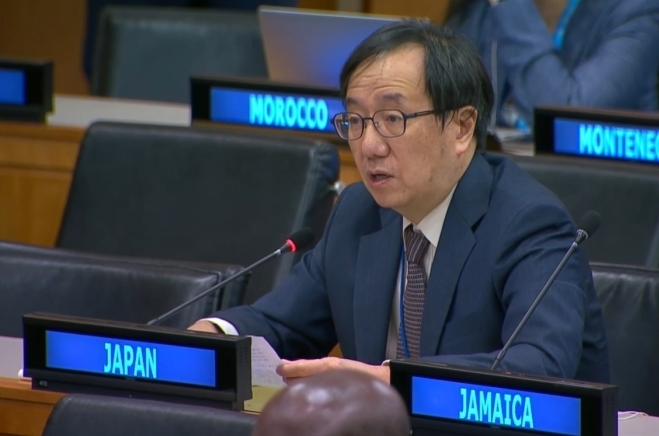安保理改革に関する政府間交渉(IGN)における山﨑大使ステートメント
令和7年4月15日

(As delivered)
Thank you, Mr. Chair and dear friend Tareq.
I would like to express our appreciation to your continuous efforts to guide us in these negotiations, and also take this opportunity to convey our gratitude to our departed friend, Axel, for his tremendous contributions and for his service as a chair of these negotiations.
Japan fully aligns with India’s statement on behalf of the G4. I will make additional remarks in my national capacity.
Regarding the size of the expanded Security Council and regional representation, Japan, as a G4 member, supports increasing the membership of the Security Council from 15 to 25 or 26 by adding 6 permanent seats and 4 or 5 non-permanent seats, the details of which are presented in the G4 statement by India.
As stated in the Pact for the Future, it is critical to improve the representation of the underrepresented and unrepresented regions and groups such as Asia-Pacific and Latin America and the Caribbean. It is also imperative to redress the historical injustice against Africa as a priority, and in this regard Japan strongly supports the Common African Position (CAP).
In particular, from an Asia-Pacific perspective, it should be highlighted that the Asia-Pacific region remains underrepresented in the Security Council, with only one-fifth of the seats (only one permanent seat and two non-permanent seats), even though our region has 54 Member States in the UN and contains more than half of the world's population. In order to become a non-permanent member of the Council, 53 countries in the Asia-Pacific Group must compete for just two seats, which is the most competitive ratio of all the regional groups.
Mr. Chair,
Last September, the Secretary-General stated that “The United Nations Security Council is outdated, and its authority is eroding. Unless its composition and working methods are reformed, it will eventually lose all credibility”. To respond to this serious and real concern, the Security Council must be reformed as soon as possible to reflect the current world situation and be more representative and equitable.
In this connection, Japan emphasizes that an expansion in both the permanent and non-permanent categories is essential. An expansion in only the non-permanent category will not address the existing imbalance in the Security Council.
Mr. Chair,
We must seize the opportunity of the 80th anniversary of the founding of the United Nations and make tangible progress on urgently needed UNSC reforms. For that goal, it is in the interest of all those who support reform to move to concrete discussions on a consolidated model and to start text-based negotiations. Japan reiterates its commitment to continue to contribute constructively to this end.
I thank you.
